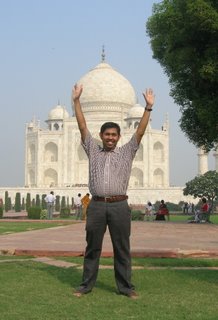Lumbini is the place where the Buddha, known as the Tathagata* was born. It is the place which should be visited and seen by a person of devotion and which should cause awareness and apprehension of the nature of impermanence. (*Tathagata - One who has found the Truth.)

Lumbini  is situated at the foothills of the Himalayas in modern Nepal. In the Buddha's time, Lumbini was a beautiful garden full of green and shady Sal trees (Shorea). The garden and its tranquil environs were owned by both the Shakyas and Kolias clans. King Suddhodana, father of Gautama Buddha was of the Shakya dynasty belonging to the Kshatriya or the warrior caste. Maya Devi, his mother, gave birth to the child on her way to her parent's home in Devadaha while taking rest in Lumbini under a sal tree in the month of May in the year 642 B.C. The beauty of Lumbini is described in Pali and Sanskrit literature. Maya Devi it is said was spellbound to see the natural grandeur of Lumbini. While she was standing, she felt labor pains and catching hold of a drooping branch of a Sal tree, the baby, the future Buddha, was born.In 249 BC, when the Emperor Ashoka visited Lumbini it was a flourishing village. Ashoka constructed four stupas and a stone pillar with a figure of a horse on top. The stone pillar bears an inscription which, in English translation, runs as follows: "King Piyadasi (Ashoka), beloved of devas, in the 20 year of the coronation, himself made a royal visit, Buddha Sakyamuni having been born here, a stone railing was built and a stone pillar erected to the Bhagavan having been born here, Lumbini village was taxed reduced and entitled to the eight part (only)".
is situated at the foothills of the Himalayas in modern Nepal. In the Buddha's time, Lumbini was a beautiful garden full of green and shady Sal trees (Shorea). The garden and its tranquil environs were owned by both the Shakyas and Kolias clans. King Suddhodana, father of Gautama Buddha was of the Shakya dynasty belonging to the Kshatriya or the warrior caste. Maya Devi, his mother, gave birth to the child on her way to her parent's home in Devadaha while taking rest in Lumbini under a sal tree in the month of May in the year 642 B.C. The beauty of Lumbini is described in Pali and Sanskrit literature. Maya Devi it is said was spellbound to see the natural grandeur of Lumbini. While she was standing, she felt labor pains and catching hold of a drooping branch of a Sal tree, the baby, the future Buddha, was born.In 249 BC, when the Emperor Ashoka visited Lumbini it was a flourishing village. Ashoka constructed four stupas and a stone pillar with a figure of a horse on top. The stone pillar bears an inscription which, in English translation, runs as follows: "King Piyadasi (Ashoka), beloved of devas, in the 20 year of the coronation, himself made a royal visit, Buddha Sakyamuni having been born here, a stone railing was built and a stone pillar erected to the Bhagavan having been born here, Lumbini village was taxed reduced and entitled to the eight part (only)". Lumbini remained neglected for centuries. In 1895, Feuhrer, a famous German archaeologist, discovered the great pillar while wandering about the foothills of the Churia range. Further exploration and excavation of the surrounding area revealed the existence of a brick temple and a sandstone sculpture within the temple itself which depicts the scenes of the Buddha's birth.
Lumbini remained neglected for centuries. In 1895, Feuhrer, a famous German archaeologist, discovered the great pillar while wandering about the foothills of the Churia range. Further exploration and excavation of the surrounding area revealed the existence of a brick temple and a sandstone sculpture within the temple itself which depicts the scenes of the Buddha's birth.
It is pointed out by scholars that the temple of Maya Devi was constructed over the foundations of more than one earlier temple or stupa, and that this temple was probably built on an Ashokan stupa itself. On the south of the Maya Devi temple there is the famous sacred bathing pool known as Puskarni. It is believed that Maha Devi took a bath in this pool before the delivery. By the side of the Ashoka pillar there is a river which flows southeast and is locally called the 'Ol' river. In 1996, an archaeological dig unearthed a "flawless stone" placed there by the Indian Emperor Ashoka in 249 BC to mark the precise location of the Buddha's birth more than 2,600 years ago, if authenticated, the find will put Lumbini even more prominently on the map for millions of religious pilgrims.
Recently, several beautiful shrines have been built by devotees from Buddhist countries. A visit to Lumbini, the birthplace of Buddha, is not only for spiritual enlightenment but also for solace and satisfaction that one gets in such a calm and peaceful place.


8 comments:
Beruntung sekali bisa mendapat kesempatan belajar di India, apalagi sempat jalan2. Di India apa sama seperti di Indonesia seperti masyarakatnya atau makanannya, kemudian kalo harga penggunaan internet di India berapa perjamnya, kalo di Indonesia, sih biasanya saya ke warnet kurang lebih rp.4000/jam, tapi ya itu kadang lelet banget koneksinya. but any way have good study while your are abroad.salam
nice blog. btw, klo bisa link afsyuhud.blogspot diganti ke fatihsyuhud.com. trims ya :)
Who knows where to download XRumer 5.0 Palladium?
Help, please. All recommend this program to effectively advertise on the Internet, this is the best program!
Great Blog..!!!! Keep Blogging.... :)
keren2 bang...
www.enjoyjambi.wordpress.com
ikutan dong berkunjung ke nepal
hehe
perjalanan yg menyenangkan
banyak tempat yg dianggap sakral di sana
Post a Comment